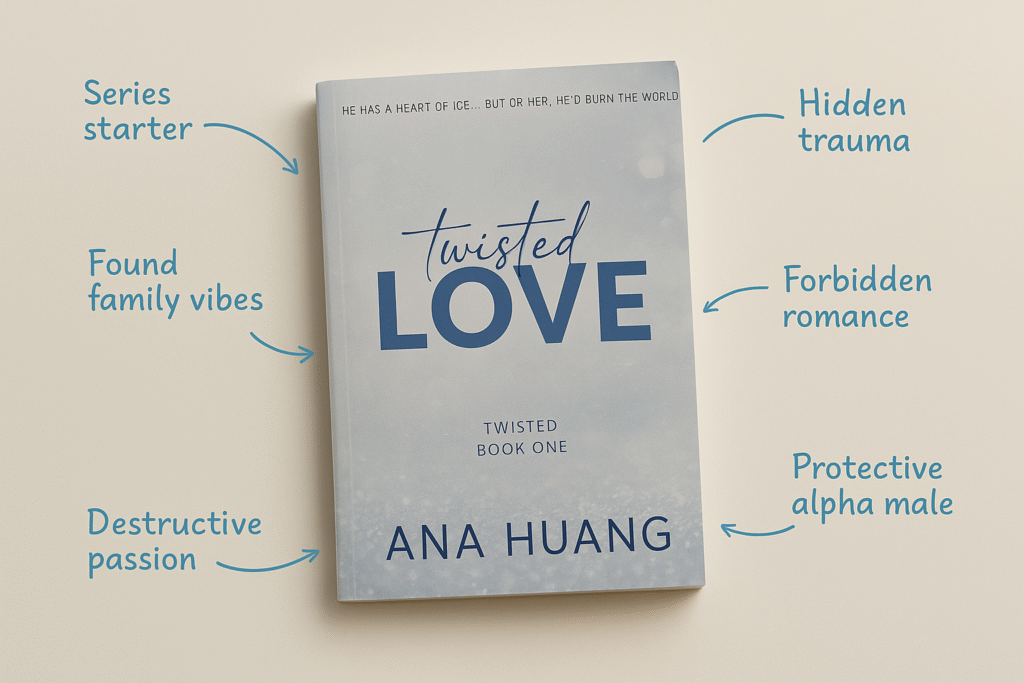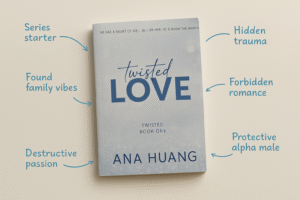Twisted Love, the electrifying first installment of Ana Huang’s Twisted Series, introduces readers to a captivating universe where romance intertwines with trauma, secrets, and personal transformation. This interconnected series follows four friends navigating love amidst emotional scars, and Twisted Love sets the stage with the intense, magnetic story of Alex Volkov and Ava Chen. These two characters, seemingly opposites, are drawn together in a relationship that defies logic, challenges comfort, and teeters on the edge of obsession.

On its surface, Twisted Love embraces familiar romance tropes, enemies-to-lovers and brother’s best friend, but Huang elevates these conventions with psychological depth and emotional complexity. The novel explores themes of trauma, revenge, abandonment, and healing, crafting a narrative that is as dark as it is addictive. With its blend of steamy romance, raw emotion, and gripping plot twists, Twisted Love is a standout in contemporary romance, offering readers a story that lingers long after the final page.
Main Characters: Flawed, Complex, and Unforgettable
At the heart of Twisted Love are Alex Volkov and Ava Chen, two richly developed characters whose contrasting personalities fuel the novel’s emotional intensity.
Alex Volkov: A billionaire CEO with a brilliant mind and a heart encased in ice, Alex is the epitome of control. Haunted by the mysterious deaths of his parents, he has built his life around uncovering the truth and protecting the few people he allows into his guarded world. His brooding demeanor and sharp intellect mask a deep well of pain, making him both compelling and enigmatic.
Ava Chen: A free-spirited photography student, Ava radiates warmth and creativity, but beneath her sunny exterior lies a past marked by childhood abuse and repressed memories. Her nightmares and emotional instability hint at a trauma she cannot fully grasp, yet her resilience and kindness make her a beacon of hope.
The story begins when Ava’s brother, Josh, Alex’s best friend, leaves for a year-long humanitarian mission and entrusts Alex with Ava’s care. What starts as a reluctant obligation soon ignites into a fiery connection, charged with desire, tension, and a love so intense it borders on dangerous. As their relationship deepens, buried traumas and dark secrets threaten to unravel their bond, pulling readers into a whirlwind of passion, betrayal, heartbreak, and redemption.
Why Twisted Love Captivates?
Some romance novels make you swoon; others make you feel something visceral and raw. Twisted Love firmly belongs to the latter category. Huang’s ability to craft imperfect, psychologically layered characters set this novel apart. Ava is not merely a cheerful heroine; she is a survivor grappling with the shadows of her past. Alex is not just a stoic billionaire; he is a man shaped by tragedy, driven by an unrelenting need for control and vengeance.

The emotional evolution of both characters is a highlight of the novel. Huang masterfully builds tension, allowing the romance to simmer slowly, creating a slow-burn dynamic that keeps readers hooked. The interplay between Ava’s vulnerability and strength is particularly compelling. She is soft but never weak, breaking under pressure but rising to reclaim her worth. Her journey toward confronting her past is both empowering and relatable, offering a narrative of resilience that resonates deeply.
Alex, meanwhile, is a fascinating study in contrasts. His cold exterior and calculated decisions mask a man wrestling with grief and guilt. His gradual unraveling, peeling back layers of control to reveal raw vulnerability, is one of the novel’s most rewarding aspects. Huang’s ability to balance romance with psychological complexity elevates Twisted Love beyond a typical love story, making it a profound exploration of human connection.
The Emotional Climax: A Moment of Raw Truth
The novel’s most powerful moment comes during its emotional climax, a heart-wrenching confrontation between Ava and Alex after she uncovers the depth of his secrets and his pursuit of vengeance. This scene shatters any illusions of a fairy-tale romance, grounding the story in brutal realism. Ava’s declaration, “You can’t love someone and destroy them at the same time,” is a gut-punch, encapsulating the novel’s central tension: how trauma can distort love into obsession and control.
This confrontation is not just a lovers’ quarrel; it is a collision of two wounded souls, each grappling with their pain. It underscores the novel’s core message: love cannot heal trauma, but it can serve as a catalyst for growth if both parties confront their wounds. The raw honesty of this moment makes it unforgettable, a testament to Huang’s skill in blending emotional intensity with psychological insight.
A Standout Intimate Scene
Ana Huang is renowned for her ability to craft steamy yet emotionally charged scenes, and Twisted Love delivers several unforgettable moments. The standout is the first time Ava and Alex fully surrender to their desire. The buildup to this scene is electric, with weeks of simmering tension, stolen glances, and unspoken longing. When their passion finally erupts, it is not merely physical but deeply psychological.

In this moment, Alex’s kiss is laced with a desperate hunger, as if he is trying to fill an unnamable void. Ava, in turn, clings to him with a sense of belonging she has long sought. The scene is a tapestry of fear, longing, passion, and vulnerability, marking a turning point in their relationship. It is the first time Alex allows someone to see beyond his carefully constructed walls, and for Ava, it is a moment of reclaiming her agency. Huang writes this not as an erotic interlude but as a pivotal moment of emotional intimacy, making it resonate on multiple levels.
The Dark Undercurrents
What sets Twisted Love apart from lighter romance novels is its unflinching exploration of dark themes. The novel weaves trauma into its narrative, giving depth to its characters and grounding their struggles in reality.
Alex’s Backstory: The tragic loss of his parents in a mysterious incident shapes Alex’s worldview. Sent to live with a family that offered little emotional support, he learned to rely solely on himself, developing an obsession with control and a fear of vulnerability. His quest for revenge drives much of the novel’s conflict, adding a layer of suspense to the romance.
Ava’s Trauma: Ava’s repressed memories of childhood abuse by her uncle slowly surface through nightmares and emotional flashbacks. The revelation of her past is chilling, shedding light on her struggles with anxiety and trust. Her journey to confront and process this trauma is a powerful arc, highlighting her resilience and strength.
These dark elements elevate Twisted Love from a simple romance to a profound exploration of how trauma shapes identity, relationships, and the capacity to love.
Areas for Improvement
While Twisted Love is a gripping read, it is not without flaws. At times, the narrative leans into melodrama, particularly in Alex’s rapid shift from emotional detachment to possessive devotion. Some plot twists, including the villain reveal, feel slightly predictable and underdeveloped, missing an opportunity for deeper complexity.
The supporting characters, such as Josh and Ava’s friend Bridget, could benefit from more nuanced development. While they play important roles, they often feel one-dimensional, serving as plot devices rather than fully realized individuals. Additionally, Huang occasionally moves quickly through emotional turning points, where more internal dialogue or reflection could deepen the reader’s connection to the characters’ psyches.
Despite these minor shortcomings, the novel’s strengths far outweigh its weaknesses, delivering a story that is both emotionally resonant and compulsively readable.
Why Twisted Love Is a Bestseller
Twisted Love has earned its place as a bestseller by delivering everything modern romance readers crave:
- Slow-Burn Tension: The gradual build of Ava and Alex’s relationship keeps readers invested, with each moment of connection hard-earned and deeply satisfying.
- Trauma-Informed Characters: Huang’s characters are shaped by their pasts, making their struggles and growth feel authentic and relatable.
- Emotional and Physical Intimacy: The novel balances steamy scenes with emotional depth, creating moments that are both sensual and meaningful.
- Relatable Themes: Struggles with trust, identity, and forgiveness resonate with readers, grounding the romance in universal experiences.
- Modern Tropes: The brother’s best friend and enemies-to-lovers dynamics, combined with a possessive yet vulnerable male lead, appeal to fans of contemporary romance.
Huang’s writing is accessible yet layered, blending emotional intelligence with a fresh, modern voice. Her characters are flawed yet hopeful, damaged yet capable of growth, making Twisted Love a timeless addition to the romance genre.
Psychological Perspective: Love Through the Lens of Attachment and Trauma
Twisted Love offers a rich canvas for psychological analysis, particularly through the lenses of attachment theory and trauma theory.

1. Attachment Theory (John Bowlby & Mary Ainsworth)
Alex and Ava’s love story is a perfect example of how childhood experiences shape adult relationships.
- Alex – The Avoidant Type: Because of the loss of his parents and neglect afterward, Alex grew up afraid of closeness. He keeps tight control over his emotions and pushes intimacy away. classic signs of an avoidant-dismissive attachment style.
- Ava – The Anxious Type: In contrast, Ava’s past abuse and unstable childhood left her craving closeness and fearing abandonment, which reflects an anxious-preoccupied style.
Together, they fall into what psychologists call the anxious-avoidant trap — one partner seeks connection while the other withdraws. Huang captures this dynamic brilliantly, showing how both must face their fears before moving toward a healthier, more trusting bond.
2. Trauma Theory (Judith Herman & Bessel van der Kolk)
Both characters also reveal how trauma shapes identity and relationships.
- Alex’s Trauma: His obsession with revenge is more than anger — it’s his way of coping with helplessness. His need for control is really a shield against his unresolved grief.
- Ava’s Trauma: Her nightmares, anxiety, and blocked memories are classic signs of PTSD. Her healing journey mirrors what trauma experts describe: first finding safety, then processing the past, and finally reconnecting with herself and others.
The novel makes one thing clear: love alone can’t erase trauma. But it can give people the courage to confront it. Alex and Ava’s growth shows how support and vulnerability can spark real healing.
Sociological Perspective: Power, Family, and Gender
Beyond psychology, Twisted Love also reflects larger social issues:
- Class and Power: Alex’s wealth and CEO status highlight an imbalance of power between him and Ava. But the story also shows Ava pushing back and reclaiming her agency, balancing the scales in their relationship.
- Family Image vs. Truth: Ava’s family hides her abuse to maintain a perfect reputation, exposing how society often values appearances over honesty especially in traditional or image-conscious cultures.
- Gender Roles: Alex is written as the classic alpha male stoic, possessive, powerful. Ava, meanwhile, seems emotional and forgiving. But Huang twists these roles by giving Ava real emotional strength and decision making power, subverting the stereotype while still delivering the appeal of a romance dynamic.

Conclusion: A Tale of Love, Wounds, and Redemption
Twisted Love is more than a spicy romance; it is a profound exploration of love’s intersection with trauma, memory, and personal growth. Ana Huang has crafted a story that is as emotionally intense as it is psychologically rich, with characters who are flawed, relatable, and deeply human. The novel doesn’t shy away from the darkness of unhealed wounds, instead using them to illuminate the transformative power of love when paired with self-awareness and healing. For readers seeking a romance that balances passion with depth, Twisted Love is a must-read. It’s a story that doesn’t just make you feel, it makes you think, reflect, and believe in the possibility of redemption through love.



